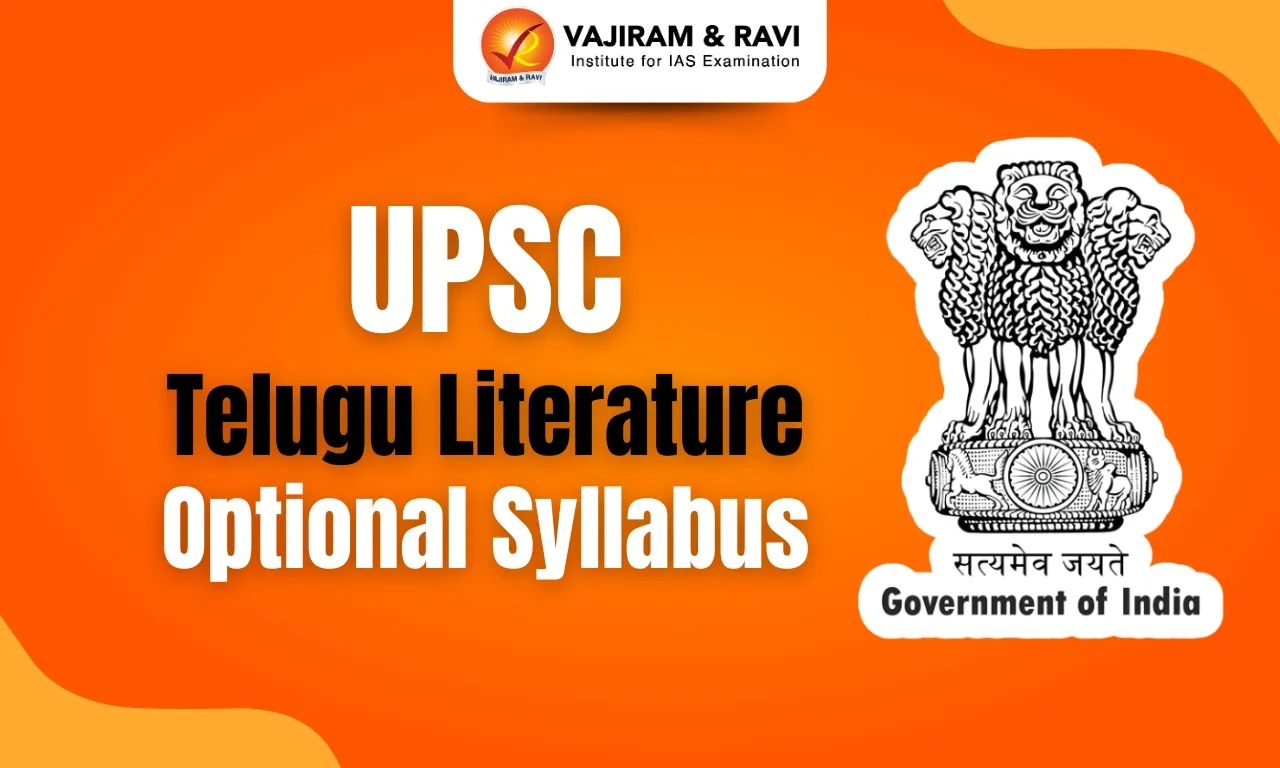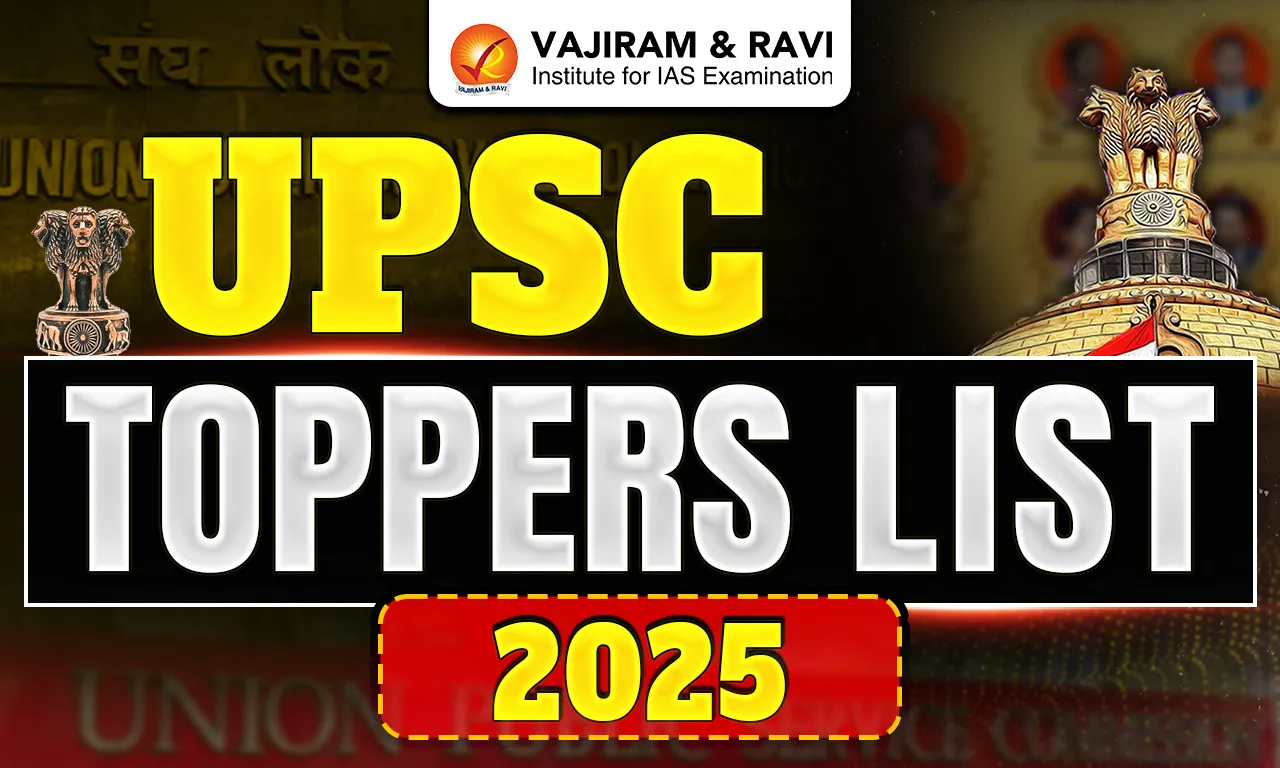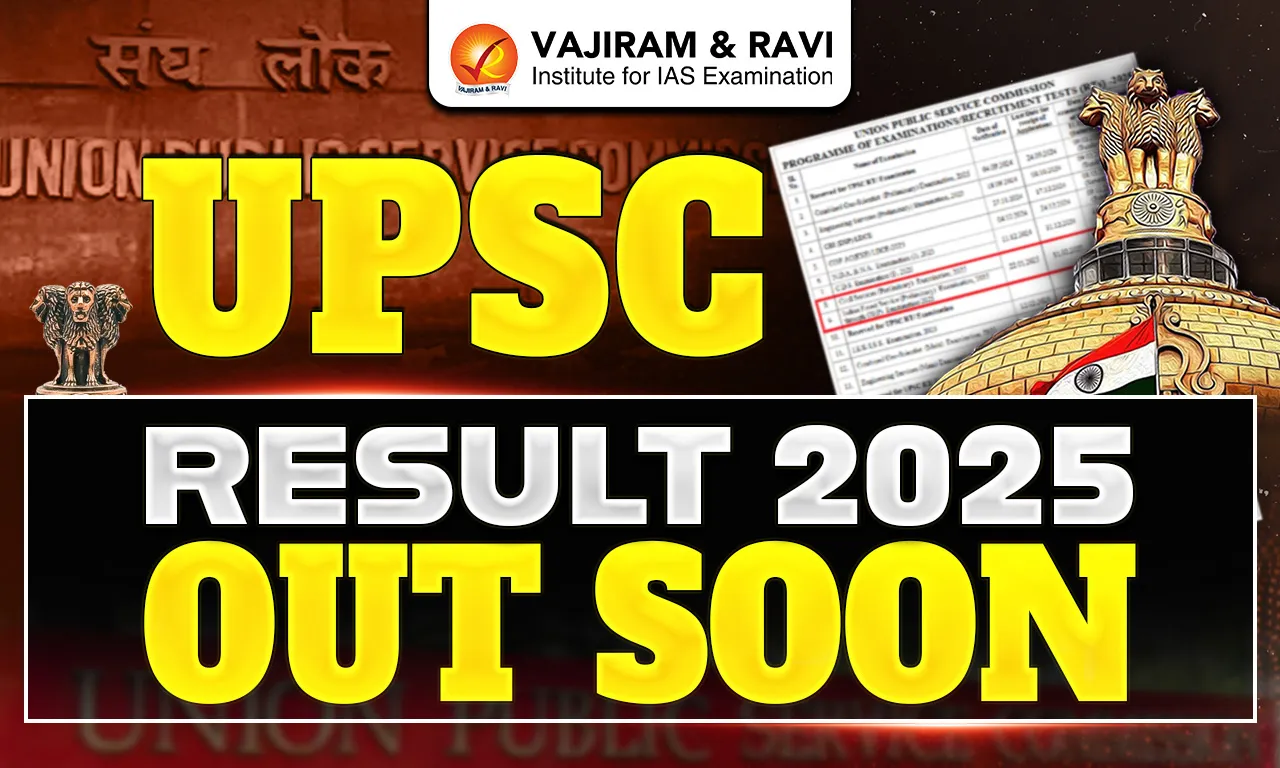UPSC Telugu Literature Syllabus for UPSC Mains preparation provides students with a clear and in-depth knowledge about the Telugu Literature culture. The Telugu Literature Optional addresses the interests related to the language and education. The syllabus covers various genres and periods in Telugu Literature from classical tests to modern writings as well as critical essays. The students will be expected to study all historical contexts, literary movements and thematic elements. From ancient poetic compositions to modern prose, the UPSC Telugu syllabus helps students develop their analytical skills as well as interpretive capabilities. In this article, we are going to cover the UPSC Telugu Literature Optional Syllabus for both Paper 1 and Paper 2.
UPSC Telugu Literature Syllabus 2026
The UPSC Telugu Literature Optional Syllabus is divided into two papers- Paper 1 and Paper 2. Both papers carry 250 marks each. UPSC Telugu Literature Optional Paper 1 covers the development of Telugu literature, importance of crucial literary works in their historical context and development of classical and medieval literature. Paper 2 of UPSC Telugu literature covers contemporary literature, including poetry, prose and literary criticism. The paper covers contemporary writers and current news in literature.
|
Overview of UPSC Telugu Syllabus |
||
|
Mains Papers |
Subject |
Marks |
|
Paper VI |
Telugu Literature Optional Paper 1 |
250 |
|
Paper VII |
Telugu Literature Optional Paper 2 |
250 |
|
TOTAL |
500 |
|
|
Time Duration |
3 hours |
|
UPSC Telugu Literature Optional Syllabus for Paper 1
UPSC Telugu Literature Optional Syllabus for Paper 1 covers the history and development of Telugu language and literature. The paper covers the study of development of Telugu Language, origin and influences on the language. The syllabus provides an in-depth analysis of classical Telugu literature, including significant works like Nannaya Mahabharatam and Vemana Padyalu, highlighting their literary and cultural significance. It also examines modern literary contributions from the 19th and 20th centuries, along with their prominent authors and works. Additionally, the syllabus explores the rich tradition of Telugu folk literature and its integration into mainstream narratives. Paper 1 of the UPSC Telugu Literature syllabus also encompasses fundamental aspects of Telugu grammar, along with its application
|
Telugu Literature UPSC Syllabus for Paper 1 |
|
|
Section |
Topics |
|
Section-A |
|
|
Place of Telugu among Dravidian languages and its antiquity |
Etymological History of Telugu, Tenugu, and Andhra. |
|
Major linguistic changes in phonological, morphological, grammatical, and syntactical levels from Proto-Dravidian to Old Telugu and from Old Telugu to Modern Telugu. |
|
|
Evolution of spoken Telugu compared to classical Telugu—Formal and functional view of Telugu language. |
|
|
Influence of other languages and its impact on Telugu. |
|
|
Modernization of Telugu language. |
|
|
Linguistic and literary movements and their role in the modernization of Telugu. |
|
|
Role of media in modernization of Telugu (Newspapers, Radio, TV, etc.). |
|
|
Problems of terminology and mechanisms in coining new terms in Telugu in various discourses (scientific and technical). |
|
|
Dialects of Telugu—Regional and social variations and problems of Standardization. |
|
|
Syntax—Major divisions of Telugu sentences: simple, complex, and compound sentences. Noun and verb predications. Processes of nominalization and relativization. Direct and indirect reporting—conversion processes. |
|
|
Translation |
Problems of translation: cultural, social, idiomatic—Methods and approaches to translation (Literary and other kinds of translation). Various uses of translation. |
|
Section-B |
Literature in Pre-Nannaya Period—Marga and Desi poetry. |
|
Nannaya Period—Historical and literary background of Andhra Mahabharata. |
|
|
Saiva poets and their contributions—Dwipada, Sataka, Ragada, Udaharana. |
|
|
Tikkana and his place in Telugu literature. |
|
|
Errana and his literary works. |
|
|
Nachana Somana and his new approach to poetry. |
|
|
Srinatha and Potana—Their works and contributions. |
|
|
Bhakti poets in Telugu literature—Tallapaka Annamayya, Ramadasu, Tyagayya. |
|
|
Evolution of Prabandhas—Kavya and Prabandha. |
|
|
Southern school of Telugu literature—Raghunatha Nayaka, Chemakura Vankatakavi, and women poets. |
|
|
Literary forms like Yakshagana, prose, and Padakavita. |
|
|
Modern Telugu Literature and literary forms—Novel, Short Story, Drama, Playlet, and poetic forms. |
|
|
Literary Movements—Reformation, Nationalism, Neoclassicism, Romanticism, and Progressive, Revolutionary movements. |
|
|
Digambara Kavulu, feminist and dalit literature. |
|
|
Main divisions of folk literature—Performing folk arts. |
|
UPSC Telugu Literature Optional Syllabus for Paper 2
The UPSC Mains Telugu Literature syllabus for paper 2 covers particular genres, critical works and an elaborate study on poets. This syllabus encompasses drama, highlighting key playwrights like Gurajada Apparao and critically examining their works within a socio-political context. The prose section explores significant fiction and non-fiction, including essays and short stories. Literary criticism is a core component of this paper. Additionally, Paper 2 of the UPSC Telugu Literature Syllabus delves into contemporary trends and movements, analyzing the impact of globalization and technological advancements on modern Telugu literary works. Below is the UPSC Telugu Literature Optional Syllabus for Paper 1 and Paper 2, structured in tables for better clarity.
|
Telugu Literature UPSC Syllabus for Paper 2 |
|
|
Section |
Topics |
|
Section-A |
Nannaya—Dushyanta Chritra (Adiparva 4th Canto verses 5–109). |
|
Tikkana—Sri Krishna Rayabaramu (Udyoga Parva-3rd Canto verses 1–144). |
|
|
Srinath—Guna Nidhi Katha (Kasikhandam, 4th Canto, verses 76–133). |
|
|
Pingali Surana—Sugatri Salinulakatha (Kalapurno-dayamu 4 Canto verses, 60–142). |
|
|
Molla—Ramayanamu (Balakanda including Avatarika). |
|
|
Kasula Purushothama Kavi—Andhra Nayaka Satakamu. |
|
|
Section-B |
Gurajada Appa Rao—Animutyalu (Short stories). |
|
Viswanatha Satyanarayana—Andhra Prasasti. |
|
|
Devulapalli Krishna Sastry—Krishna Paksham (excluding Urvashi and Pravasam). |
|
|
Sri Sri—Mahaprasthanam. |
|
|
Jashuva—Gabbilam (Part I). |
|
|
C. Narayana Reddy—Karpura Vasanta Rayalu. |
|
|
Kanuparti Varalakshmamma—Sarada Lekhalu (Part I). |
|
|
Atreya—N.G.O. |
|
|
Rachakonda Viswanatha Sastry—Alpajeevi. |
|
UPSC Telugu Language Paper Syllabus Best Books
The following list of books can help you prepare for UPSC Telugu Language Paper Syllabus:
- "History of Telugu Literature" by Biruduraju Ramaraju is a treasure of historical analysis of Telugu literature.
- "Telugu Sahitya Charitra" by Viswanatha Satyanarayana is an excellent analytical piece on the literary developments and movements during various eras.
- "Telugu Kavitvam - A Comprehensive Study" by Pullela Sriramachandrudu is perfect for a detailed study on the poetic forms and the themes.
- "Nannaya's Mahabharatam" is essential as a primary text in classical literature.
- "Modern Telugu Literature" by Arudra and "Complete Works of Gurajada Apparao" are some of the modern literary works.
- "Telugu Sahityam" by Kandukuri Veeresalingam, "Vemana Padyalu," and critical essays and literary reviews through periodicals and anthologies are also extremely useful.
Last updated on March, 2026
→ UPSC Notification 2026 is now out on the official website at upsconline.nic.in.
→ UPSC IFoS Notification 2026 is now out on the official website at upsconline.nic.in.
→ UPSC Calendar 2026 has been released.
→ UPSC Final Result 2025 is expected to be released soon.
→ Check out the latest UPSC Syllabus 2026 here.
→ UPSC Prelims 2026 will be conducted on 24th May, 2026 & UPSC Mains 2026 will be conducted on 21st August 2026.
→ The UPSC Selection Process is of 3 stages-Prelims, Mains and Interview.
→ Prepare effectively with Vajiram & Ravi’s UPSC Prelims Test Series 2026 featuring full-length mock tests, detailed solutions, and performance analysis.
→ Enroll in Vajiram & Ravi’s UPSC Mains Test Series 2026 for structured answer writing practice, expert evaluation, and exam-oriented feedback.
→ Join Vajiram & Ravi’s Best UPSC Mentorship Program for personalized guidance, strategy planning, and one-to-one support from experienced mentors.
→ Check UPSC Marksheet 2024 Here.
→ UPSC Toppers List 2024 is released now. Shakti Dubey is UPSC AIR 1 2024 Topper.
→ Also check Best UPSC Coaching in India
UPSC Telugu Literature Optional FAQs
Q1. Which is the toughest optional in UPSC?+
Q2. What is the 7/5/3 rule in UPSC?+
Q3. Is Literature a good optional for UPSC?+
Q4. Can I write the UPSC exam in Telugu medium?+
Q5. Which language medium is best for UPSC?+













